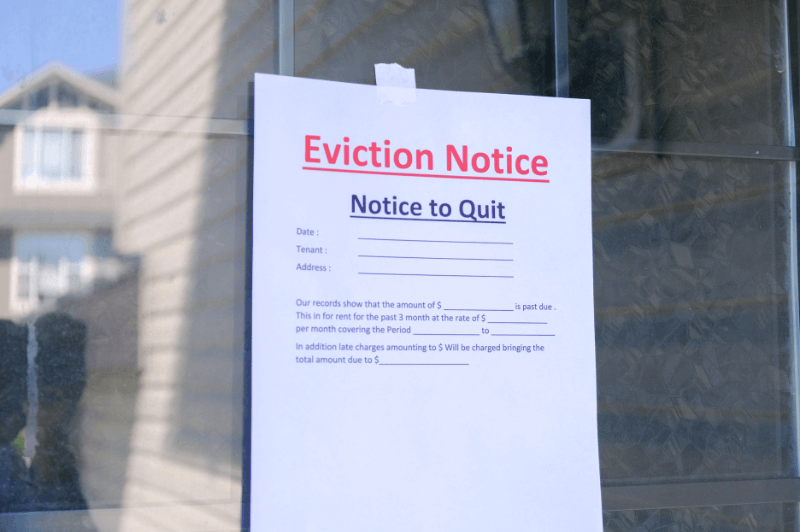
One of the main drawbacks to being a property owner or landlord is dealing with the potential for squatters.
These people can become a nuisance for you because they’re occupying a building or room within a building without paying anything to live there, like rent or property taxes. Even though this doesn’t sound legal, squatters have some rights in many states.
Since squatting is different from trespassing under the law, how you handle squatters will be slightly different from how you would deal with trespassers.
Dealing with squatters is already frustrating, but when you’re going through the home process of selling a house with lots of people live there, it gets more complicated and even more frustrating.
Knowing how to deal with squatters in your home or rental property is vital to controlling your property and selling your home like you intend to. We’ve compiled everything you need to know when dealing with squatters in your home if you ever find yourself in this situation.
How To Deal With Squatters
The situation is far more delicate than one might think when dealing with squatters. As simple as it might seem to show up at the door and start trying to kick them out, squatters, who are not considered trespassers in many circumstances, have rights under the law.
Because they have rights at a certain point in Texas, dealing with them is more complicated. You’ll want to ensure that you have a level head and know your rights and theirs so you can deal with them accordingly.
One of the best things you can do as a landlord when dealing with squatters is to do everything you can to prevent them from presenting in the first place. Some ways you can help avoid squatters on your property include:
- Changing the locks when tenants move out
- Installing security cameras and locks on doors and windows
- Boarding up windows if necessary
- Place “no trespassing” signs around the property because many people will avoid properties like that because they know landlords are watching
- Hire someone to check on your properties if you can’t do this yourself, often to reduce the risk of squatters or catch them early.
Squatters’ Rights in Texas
Squatters’ rights vary from state to state, and in Texas, these individuals can claim squatters’ rights by continuously occupying a residence. Unlike other states, Texas views squatters within the first 30 days as trespassers and, from then on, squatters.
One of the most common and well-known squatters’ rights in Texas and other states is that they cannot be displaced from their home without legal notice from a landlord.
This can happen when a landlord tries to evict people without notice, and the tenants don’t leave. Eventually, they can try to claim the property as their own if they’ve been “living” there for a specified amount of time. If it gets to this point, gaining back control of your property can be far more taxing.
Like legal tenets, you cannot remove someone from your property without providing legal notice to vacate the premises. When you provide legal notice to the squatter or squatters, you can evict squatters from your property, but things get tricky if they file for adverse possession.
Adverse Possession Laws
Adverse possession laws are common in other states, not just Texas. These laws state that after a specified amount of time, a squatter can file for an adverse possession claim to attempt to take ownership of the property they’re squatting at.
They can sometimes earn possession of the property after a certain length of time.
When they apply for an adverse possession claim in Texas, they can earn the legal right to own that real estate. For a squatter to attempt to file for this claim, they have to have continuous occupation of the property. The default time is ten years in Texas.
They can try to take legal ownership of the property by following these five steps:
- They have “hostile” ownership, which means they’re unaware they’re trespassing on the property, also known as a good faith mistake.
- They have to be the only occupant of the property or room.
- The squatter has to inform the public that they’re occupying the property.
- They have to be physically on the property they occupy.
- They have to live there continuously for at least ten years.
Squatters’ Rights After 30 Days
Squatters rights in Texas differ from some other states, but there are similarities. As a landlord, you’ll need to provide legal notice to the tenants to vacate the property within whatever specified timeframe you have in mind. Thirty days are pretty standard in many situations but not in Texas.
Since squatters have no legal protections in Texas as in other states, they’re considered trespassers, and you can legally treat them as such.
The problem is at the 30-day mark. From here, they can start to claim adverse possession (even though the benchmark is ten years), legally classifying them as squatters rather than trespassers.
After those 30 days are up, and they’re still there, you can start taking legal action. One of the main things you’ll want to do is call law enforcement.
Even though they can’t do much to force someone out of the property, it will be documented via a police report, and a police officer will be present if they become hostile towards you or attempt to claim you were hostile to them.
Whether they’re violating your lease agreement or broke into a vacant property, ensuring you take legal action will help remove squatters from your property.
Legal Ways of Getting Rid of Squatters
Despite the complicated nature of dealing with squatters in Texas, there are legal ways to get rid of them and get back on track to sell your home.
First, you’ll want to call the police when you realize you have a squatter. Even if the squatters aren’t dangerous, it’s good to have a mediator and documentation that you know you have a squatter and are doing everything possible to remove them from the property.
You’ll need to provide legal notice to a tenant or squatter that they need to move off the premises. Even in Texas, where squatters don’t have many rights, legal notice is required, especially when it’s originally legal tenants of a building occupying a space.
When the squatters don’t move out by the specified date on your eviction notice, you can take it to court. You’ll need to file an unlawful detainer lawsuit (eviction notice) and serve it to your squatters.
Doing this will jumpstart the eviction process. From here, you can start calling the police more often if they refuse to leave by the date and even take it to court to have them removed from your property.
Hopefully, your unlawful detainer lawsuit will work, but when it doesn’t, you’ll need to keep calling the police and take the case to court because they’ll determine it’s a civil matter.
You’ll likely have a much better case than your squatters, but be sure you document everything regarding eviction notices and communications with the squatters to solidify your case to the judge.

Squatters: Dos and Don’ts
As a property owner or landlord, dealing with squatters or those illegally living on your property can be frustrating. Working in property management brings upon this potential risk, unfortunately.
Even though you probably want to act quickly and potentially with frustration, you should consider some dos and don’ts when dealing with squatters.
Dos:
- Keep thorough records of squatters and any communications with them, including agreements, contracts, and any notices to vacate.
- Act fast but follow all legal procedures like filing the proper paperwork, eviction notices, and trespassing paperwork.
- Secure your property by changing locks and boarding windows to ensure squatters cannot get in or return once you evict them.
- Call local law enforcement officers if necessary to help move the squatters off your property.
Don’ts:
- Don’t shut off the electricity, water, or gas without following legal procedures because it can backfire.
- Don’t change the locks without notice or while people are still inside the property.
- Never use violence or threats because it’s illegal and you can face criminal charges or civil liability.
- Don’t assume you can enter the property without consent.
As frustrating as dealing with squatters can be, remembering these main dos and don’ts will allow you to handle the situation professionally and maturely.
Doing so will only move the process in your favor compared to acting irrationally, angry, and potentially doing illegal things to get the squatters to leave.
Final Words
Many things can go wrong when selling your house, from not passing inspections to not getting the offers you want to even deal with squatters. Knowing squatters’ rights and the best and legal ways to eliminate them can make the house-selling process faster and smoother.
If you’re looking to sell a house fast in Texas, we buy houses Dallas residents are looking to sell and can help move the process along.
We have available cash home buyers in Arlington and other Texas cities who will purchase your home, whether you have squatters or not. Contact us today to learn more!
